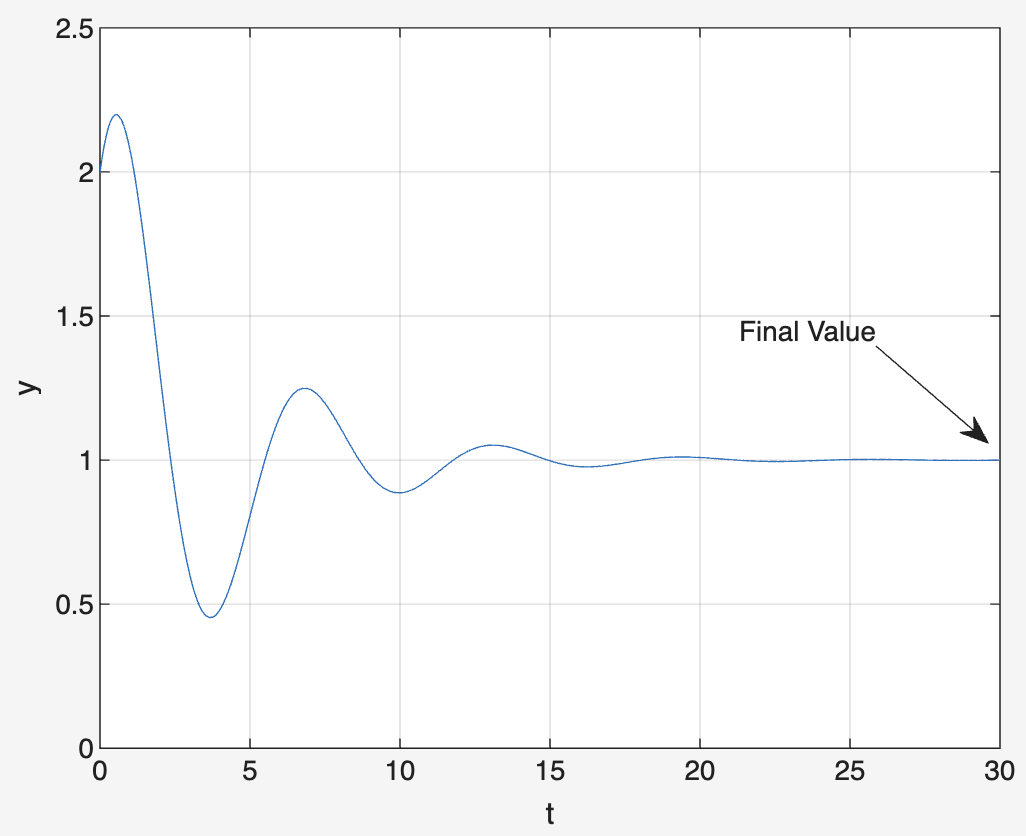Final Value Theorem¶
In Laplace transform and Z-transform, the final value theorem helps to find the time domain value of function \(x(t)\) at infinite time (t=∞) without needing to find the inverse Laplace transform \(\mathcal{L}^{-1}[X(s)]\). Value at infinite time denotes the final settled value of the signal. Finding inverse Laplace transform could be complicated and time consuming.

Definition¶
Final value theorem of Laplace transform states that,
$$x(t)\leftrightarrow{}X(s)$$
Then,
$$\lim_{t\rightarrow{}\infty{}}x(t)=x(\infty{})=\lim_{s\rightarrow{}0}sX(s)$$
For z-transforms, if
$$x[n]\leftrightarrow{}X(z)$$
Then,
$$\lim_{N\rightarrow{}\infty} x[N]=\lim_{z\rightarrow{}1}(1-z^{-1})X(z)$$
Example of Final Value theorem¶
Find the final time domain value of function :
$$X(s)=\cfrac{1}{s}+\cfrac{1}{s^2+2s+2}+\cfrac{s+1}{s^2+2s+2}$$
Using final value theorem,
$$\lim_{s\rightarrow{}0}s\left(\cfrac{1}{s}+\cfrac{1}{s^2+2s+2}+\cfrac{s+1}{s^2+2s+2}\right)=1$$
The settled time domain value using final value theorem is 1.
Inverse Laplace Transform method
Using partial fractions we can find the inverse laplace transform of the above function. We get, $$x(t)=1+e^{-t}[\sin(t)+\cos(t)]$$ If we substitute \(t=\infty{}\), we get \(x(\infty{})=1\) which matches final value theorem.
Derivation of Final value theorem for Laplace transform¶
Laplace transform of signal \(x(t)u(t)\) is :
$$\mathcal{L}[x(t)]=X(s)=\int_{0}^{\infty}x(t)e^{-st}dt$$
Taking derivative of both sides :
$$\mathcal{L}[\cfrac{dx(t)}{dt}]=\int_{0}^{\infty}\cfrac{dx(t)}{dt}e^{-st}dt$$
Using derivative in time-domain property of Laplace transform,
$$\mathcal{L}[\cfrac{dx(t)}{dt}]=\int_{0}^{\infty}\cfrac{dx(t)}{dt}e^{-st}dt=sX(s)-x(0)$$
Finding the limit when \(s\rightarrow{}0\) on both the sides,
$$\implies{}\lim_{s\rightarrow{}0}\int_{0}^{\infty}\cfrac{dx(t)}{dt}e^{-st}dt=\lim_{s\rightarrow{}0}\left(sX(s)-x(0)\right)$$
$$\implies{}[x(t)]_0^{\infty{}}=\lim_{s\rightarrow{}0}\left(sX(s)-x(0)\right)$$
$$\implies{}x(\infty{})-x(0)=\lim_{s\rightarrow{}0}sX(s)-x(0)$$
$$\implies{}x(\infty{})=\lim_{s\rightarrow{}0}sX(s)$$
See also : Initial Value Theorem